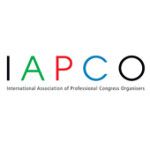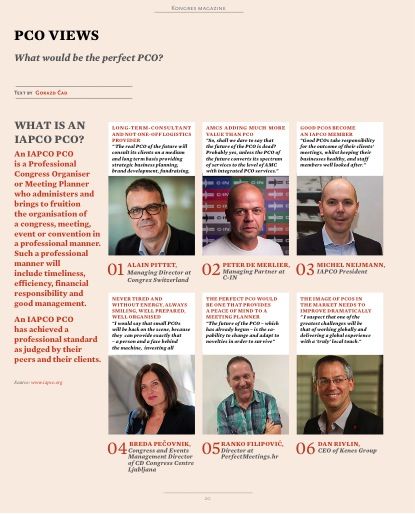THE FUTURE OF PCO
PCOs of the future certainly have their work cut out for them. [pullquote]I suspect that one of the greatest challenges will be that of working globally and delivering a global experience with a ‘truly’ local touch.[/pullquote] Many PCOs feel the need to expand and expanding relates to setting the high standard international clients anticipate. I imagine this challenge is faced by every company that expands its activities worldwide; how to meet and exceed clients’ expectations everywhere we work – in a world of diverse cultures and constantly changing business environments. To succeed, PCOs will have to bridge these gaps by moving their core activities that demand high levels of expertise, such as the scientific programmes, and centralizing them to ensure quality.
Further, the image of PCOs in the market needs to improve dramatically, particularly when it comes to commissions and in turn, how PCOs make a profit. It will always be an issue when on one side you have people who are basically volunteers and perhaps cannot fully master business management and yet are in control of a budget of millions, and on the other side there are PCOs who have only been hired to do one meeting. If you are a core PCO and you sign a deal to work with an organisation for several years you have more of a vested interest in working with your client as a long-term partner and being much more open in terms of how you do business and how you expect to get paid. This is not to say that one-time PCOs are not working in a similar manner to long term PCOs. However, by definition, long term relationships encompass additional considerations and transparency is a key issue to maintain client trust.
And finally, the future PCO will be challenged by competition. The market is saturated and there is a lot more competition. Increasingly, associations are looking at what else PCOs can offer in terms of innovation, knowledge and education. Once upon a time it was all about logistics, but more recently, the emphasis is on content and knowledge. PCOs will also quickly realize that resources are becoming scarce. Returning clients will need to consider countless issues – from rotation policy (they can’t just go “anywhere they want” anymore), to meeting format (which may need to change and become more interactive to attract participants in the future), to new ways to raise funds. PCOs may very well have to look far and wide for new clients, let alone the ability to retain existing clients. Success is in finding the balance – and with that, serving the client is first and foremost – from beginning to end, meeting and exceeding their needs every time – all the time.
THE PERFECT PCO
The perfect, or ‘ideal’ PCO, is all about integrity – defining, maintaining and ‘retaining’ it. [pullquote]Integrity is the core of any true partnership and so too, between PCOs and clients.[/pullquote] The appointed PCO establishes and nurtures relationships with association and committee members, delegates, sponsors and exhibitors, and suppliers – behind the scenes and on site. In a word, the perfect PCO is the ultimate facilitator between all of the players involved in orchestrating and delivering a (no less than) perfect event.
This sense of omniscient leadership leading up to and during the event is indeed the PCO’s core responsibility, but no less important is the PCO’s event and industry knowledge, event growth, consistency, and its ability to deliver a true global experience with local expertise. This means – anywhere, at any location in the world. The PCO must also deliver continuity between events, skillfully managing and growing the society or association, leading up to the next event. Having served as a long term PCO for over five decades, I can say that we are defined and judged by our performance, delivery and the relationship we develop and maintain with our clients, from the initial handshake until the very last of the delegates has left the venue. Then the real work begins – nurturing and maintaining a long term or Core PCO relationship.
About the Author
Dan Rivlin is the CEO of Kenes Group, one of the world’s leading Professional Conference Organisers (PCOs). Dan joined Kenes in 1993 and rose through the ranks of the organisation holding senior managerial positions, including Operations Director, prior to becoming CEO in 1999. His vision and guidance coupled with accumulated experience and expertise gives Kenes Group its time-honoured stability and market presence. Dan holds a B.Sc. in Hospitality Management from Florida International University and an MBA, with a major in Management, from the University of Bradford, UK.
WHAT IS AN IAPCO PCO?
An IAPCO PCO is a Professional Congress Organiser or Meeting Planner who administers and brings to fruition the organisation of a congress, meeting, event or convention in a professional manner. Such a professional manner will include timeliness, efficiency, financial responsibility and good management.
An IAPCO PCO has achieved a professional standard as judged by their peers and their clients. Each member has had to undergo rigorous entry criteria:
WHAT IS AN IAPCO PCO?
— Proof of organisation of 10 international meetings, of which 5 must be of over 400 participants
— Confidential references received from past clients
— Site inspection of a selected international congress
— Successful interviews by peer review of international client, local organising committee, delegates and exhibitors of a selected international congress
— Inspection of offices and audit of procedures
— Once accepted into the Association, an IAPCO PCO has to maintain their membership by participating in an annual quality assessment including:
— Statutory returns to prove on-going trading and notification of management changes
— Submission of Congress Check Lists to ensure continuous activity in the international meetings market
— Quality Self Assessment to position oneself against one’s competition and peers and to provide a benchmark for improvement
— Attendance at the annual Quality Seminar at least once every three years
As a result of the above, an IAPCO PCO offers a unique quality assurance recognised by congress clients and suppliers all over the world.

WHAT IS THE DIFFERENCE BETWEEN AN IAPCO PCO AND A NON-MEMBER PCO?
A non-member PCO may differ from an IAPCO PCO in one or more of the following ways:
– Core business is not professional congress organisation
– Level of expertise is not ensured through continuous quality control and assurance procedures
– Not under review by a Committee of Ethics in case of a dispute
– Not stimulated to take part in annual educational programmes
– Not part of an international forum exchanging ideas and expertise.
– This does not mean that non-member PCOs are unqualified to do the job to the highest level; it means that, when engaging or employing a PCO, careful attention should be paid to the level of expertise and quality assurance to ensure that the right PCO is selected.
IAPCO is a worldwide sign of quality and the solution to congress organising is to appoint an IAPCO member.

[xyz-ihs snippet=”KONGRES-SEPTEMBER-2015″]














